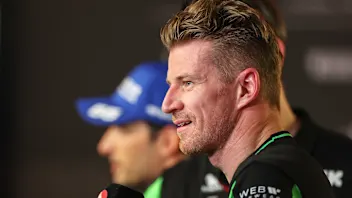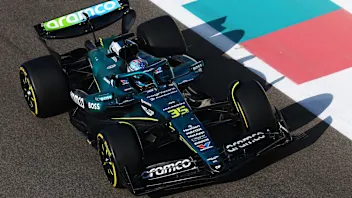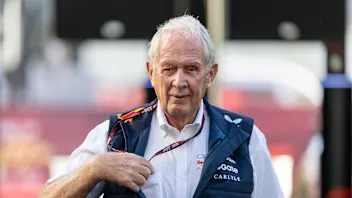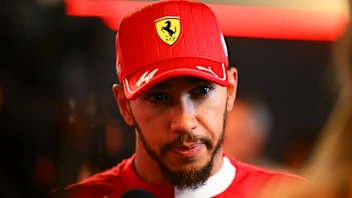The 2014 season review: Hamilton's title - but only just!
Perhaps we should be thankful for the spark plug insulation problem that brought Lewis Hamilton to a halt in the opening race of the season in Melbourne.
The Mercedes racer wouldn’t see it that way, but that trivial little failure had a massive effect as it put Hamilton on his back foot right from the start and forced him to attack.
As he retired, team mate Nico Rosberg won and opened a 25-point lead. With only a seven-point difference between first and second place (apart from in the double-point finale in Abu Dhabi), that meant Hamilton had his work cut out clawing back that gap. That, and subsequent dramas, would make the 2014 FIA Formula 1 World Championship such a gripping encounter, even though the Silver Arrows were in a class of their own.
The season ushered in the most significant rule changes in history, with the normally aspirated 2.4-litre V8 engines replaced by new 1.6-litre turbocharged V6 power units with their complex ERS systems that gave the sport a much cleaner and greener image more relevant to developing road car technologies. Teams now had to complete races on 100 kg of fuel - around 30 percent less than in 2013 - whilst drivers were only allowed five power units per season rather than eight engines. Blown diffusers, which had been a key performance differentiator in previous years, were banned - a move that had a bigger effect on some drivers than others...
Aerodynamics and tyre conservation remained crucial issues, but teams and drivers also needed to master the complicated technology and how to optimise use of mechanical power and the ERS systems which affected horsepower and economy and thus race strategy. Given the complex new systems, it was perhaps inevitable that the teams would face reliability issues in 2014, but though doomsayers speculated the worse, well over half the field made it home at the first race in Australia - a testament to the brilliant work done by F1 racing’s many extraordinary engineers.
The battle for the title between Hamilton and Rosberg naturally held centre stage throughout the season and was not decided until the final race. And Mercedes deserved full credit for letting their men race at all times, even when things got very tense mid-season.
The technology was expected by many to favour the cerebral Rosberg, who had studied subjects as complex as aerodynamics. But while he, perhaps surprisingly, had the upper hand during qualifying, with 11 poles to Hamilton’s seven (though the Englishman had problems in qualifying in Austria, Great Britain, Germany and Hungary), it was Hamilton who more often than not had the edge in race conditions.
Following Rosberg’s season-opening victory in Australia, Hamilton won four races in a row - in Malaysia, Bahrain, China and Spain - to take the points lead for the first time. But after Rosberg’s controversial trip down the escape road at Mirabeau during qualifying at Monaco - which effectively clinched him pole position by denying Hamilton a final shot at it - the German won to get his nose back in front . Rosberg then extended his lead with a gutsy second place in Canada when Hamilton retired with the same ERS/rear brake problem that the German was forced to cope with.
That race gave Red Bull their first victory of the season, but it did not come, as one would have expected before the season started, from Sebastian Vettel. The reigning world champion was roundly eclipsed by new team mate Daniel Ricciardo in 2014, the Australian having moved up from Toro Rosso to replace countryman Mark Webber. The RB10’s wayward rear end was never to Vettel’s liking and he struggled badly to get the best from himself and his car. Ricciardo, however, was the revelation of the season. He’d finished second to Rosberg in Melbourne, only to be excluded for fuel flow rate abnormalities, but thereafter he was fourth in Bahrain and China, and third in Spain and Monaco. When the duelling Silver Arrows hit trouble in Montreal, he was the hugely popular winner after a gritty drive.
In Britain it was Hamilton’s turn to avenge himself on Rosberg who had won the previous year’s race when Hamilton, leading, suffered a tyre failure. It wasn’t straightforward - the Briton had screwed up qualifying on home ground as tricky track conditions had dissuaded him from pushing hard for pole on his final attempt - but he redeemed himself on Sunday. He was already catching Rosberg when the latter suffered downshift problems, forcing him to retire. Despite seeing his points lead slashed, Rosberg wasn’t down for long, and took advantage of Hamilton’s brake failure-induced off in German qualifying to claim his own home soil triumph next time out.
Up to this point, the two Mercedes racers’ relationship had generally been good all season, save for a few gripes. Hamilton grumbled about Monaco, just as he did when he discovered that Rosberg had turned his engine up, against team protocol, to try and beat him in Bahrain. Rosberg, likewise, had complained about Hamilton in Spain. But in Hungary the intensity level was raised when Hamilton, who’d started from the pit lane after his car caught fire in qualifying, refused to comply with what he deemed to be an unreasonable request from the pit wall to let Rosberg (on a different strategy) past midway through the wet/dry race. Hamilton then robustly defended third place from Rosberg on the final lap as up front Ricciardo again excelled to win for Red Bull ahead of Fernando Alonso’s Ferrari.
At the next race in Belgium Rosberg was determined to lay down a marker, though perhaps not one quite so controversial. Challenging Hamilton for the lead on the second lap, the German touched the Briton’s left rear tyre with his right front wing endplate. Hamilton retired with damage sustained limping home with a puncture; Rosberg dropped to second after a nose change, as Ricciardo won for the third time.
Rosberg subsequently apologised and acknowledged his responsibility for what Mercedes described as an ‘unacceptable’ collision, but the incident would prove to be something of a turning point as Hamilton, now 29 points back from his team mate, vowed internally to raise his own game. Over the next few races he’d do that with aplomb.
In Italy Rosberg twice got his braking wrong going into the first chicane, the second time under considerable pressure from Hamilton, allowing the Briton to take victory. Then, in Singapore, the German had his second retirement of the season when foreign matter in his steering wheel electronics prevented him getting off the grid, and then consigned him to a brief run without ERS. Hamilton won again, and crucially took back the points lead.
A fortnight later in Japan Rosberg led in the rain, but a blinding race by Hamilton - and a sensational pass around the outside at Turn 1 - allowed the Briton to extend his points lead, and he did it again after winning in Russia as Rosberg’s first-corner outbraking attempt backfired and doomed the German to an afternoon of playing catch-up to second place. In the United States Rosberg again led, but a determined Hamilton was able to slip ahead to take his fifth victory in a row. Rosberg later admitted he was just not on it enough in Austin.
Fighting for his championship hopes, the German showed his resilience in Brazil by beating Hamilton and thus setting up the situation where Hamilton had to finish second in the season finale at Abu Dhabi to guarantee himself of a second drivers' crown. Rosberg took his 11th pole of the season at Yas Marina, but Hamilton owned the race from the start and Rosberg was beaten before an ERS problem dropped him back to 14th place, effectively evening the score between them to three failures to score points apiece.
While the title fight was in doubt until the very end of the season, Ricciardo’s three victories, plus podium finishes in Spain, Monaco, Britain, Singapore and the United States, left him well clear of anyone else in third place in the standings. Vettel, his best finishes in a disappointing year a second in Singapore and thirds in Malaysia, Canada and Japan, did what would have been unthinkable 12 months previously, and announced in Japan that he was leaving Red Bull. It wasn’t confirmed at the time, but it was clear that he was off to Ferrari.
Part of Red Bull’s problem, and Ferrari’s, was that their Renault and Ferrari power units were incomparable to the Mercedes V6, with some speculating as much as an 80 bhp deficit. But when it all comes down to research and development for new powertrains for a new formula, that’s the way the cookie sometimes crumbles.
A switch to Mercedes power proved an inspired choice for Williams, who richly deserved their third place overall in the constructors’ standings. Chief technical officer Pat Symonds’ experience paid dividends, as the team that had been so spectacularly unsuccessful the previous year was suddenly a major contender.
Little things prevented the Grove team from gaining the podiums they deserved until Valtteri Bottas broke through in Austria, where team mate Felipe Massa had stuck his car on the only non-Mercedes pole of the season. Bottas finished in second in Britain and Germany, before taking third in Belgium, Russia and Abu Dhabi to help seal fourth overall in the drivers’ stakes ahead of former champions Vettel and Fernando Alonso. Massa, meanwhile, showed his old pace was still there with a podium in Brazil, and by hounding Hamilton all the way home in Abu Dhabi where, for a few tantalising moments, a Williams victory seemed a possibility.
If Red Bull had a bruising season, that was nothing compared to Ferrari who failed to win a race for the first time since 1993. It was clear from the start that the F14 T wasn’t a car good enough to win, and after Stefano Domenicali’s shock resignation in April, Ferrari roadcar ace Marco Mattiacci was drafted in. Meanwhile Sergio Marchionne eventually succeeded Luca di Montezemolo as chairman after Monza. In Suzuka it became clear that Alonso, who’d only stood on the rostrum twice, might be on his way out of the Scuderia, and as it was finally confirmed in in Abu Dhabi that Vettel was replacing the Spaniard, there came another shock with the announcement that Mattiacci was being replaced by long-time sponsors’ representative Maurizio Arrivabene. The latter move was praised by Kimi Raikkonen, who endured his own annus horribilis in 2014, failing to reach the podium for just the second season in his career.
Raikkonen’s former team McLaren also struggled. Kevin Magnussen impressed initially in his rookie season, scoring a podium finish on his debut in Australia, but though he was quick, he often got into scrapes with others which resulted in penalties. In the end he was overshadowed by team mate Jenson Button, who, in a year in which he mourned the passing of his popular father John, made the best of his experience and racecraft to outscore the Dane 126-55.
With Nico Hulkenberg and Sergio Perez on board, Force India continued to punch above their weight - with the stand-out performance of their season being Perez’s excellent third in Bahrain. For a good period the Silverstone-based squad led McLaren in the constructors’ standings, though they eventually slipped back to a still creditable sixth.
Toro Rosso looked very good at times as Daniil Kvyat proved to be the rookie of the year, and Max Verstappen’s FP1 performances, especially in Brazil, marked him as a man to watch in 2015, but development seemed to slow down as the year progressed. Lotus collapsed completely, hurt by delays with their new E22 which wasn’t a patch on the cars they’d fielded in the two previous seasons. But at least they scored points. For the first time since they entered F1 in 1993, Sauber failed to do that.
Elsewhere Marussia and Caterham missed the races in the United States and Brazil owing to financial issues. It was a tragic year for the former; after the high of Monaco where Jules Bianchi’s ninth place gave them their first points since entering Grand Prix racing in 2010, the Frenchman’s horrible accident in Suzuka left them bereft. Bianchi remains in a critical but stable condition and very much in the F1 fraternity’s thoughts.
In the end, it was generally agreed - even by Rosberg - that in Hamilton the right man won, and despite off-track politics the fantastic action on track more than won out. Hamilton became the 16th driver, and fourth from Britain, to become a multiple world champion, but only nine have won three or more drivers’ crowns. Can the Briton join that exclusive club next year? Given his 2014 form, you wouldn’t bet against it.
Next Up
Related Articles
 Hulkenberg pleased to score points in Sauber’s final race
Hulkenberg pleased to score points in Sauber’s final race Crawford sets the pace at Abu Dhabi post-season test
Crawford sets the pace at Abu Dhabi post-season test Dr Helmut Marko to leave Red Bull motorsport advisor role
Dr Helmut Marko to leave Red Bull motorsport advisor role F1 AcademyFerrari sign Larsen for 2026 F1 ACADEMY campaign
F1 AcademyFerrari sign Larsen for 2026 F1 ACADEMY campaign Hamilton 'doesn't have a mindset' for 2026 after tricky year
Hamilton 'doesn't have a mindset' for 2026 after tricky year Sainz hopes point-less finish in Abu Dhabi ‘serves as a wake-up call’
Sainz hopes point-less finish in Abu Dhabi ‘serves as a wake-up call’